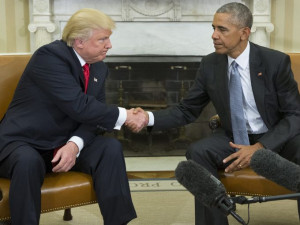
While the previous week saw, in this behalf, Obama lifting sanctions on the provision of sophisticated weapons to the Syrian “rebels”, clearly an attempt at reversing the Syria and Russian forces’ gains against terrorist outfits, this week saw him ordering an inquiry into whether the US election was hijacked by Russia or not.
While the decision itself is as erroneous as has been Obama’s Syria policy, this decision serves only one purpose – stoke the fires of ‘Russophobia’ in America and Europe, and thereby force the president-elect into following an explicitly anti-Russia policy globally.
In Obama administration’s calculations, this appears to be the only way to stay alive in the Mid-eastern geo-political landscape. The calculations runs something like this: if the US is to stay relevant in the region, the many wars it has orchestrated in the last decade or so must continue. Hence, the decision to buttress the provision of weapons to the Syrian “rebels”, weapons that will most certainly be used against the Syrian and Russian forces and further ignite the flares of the war.
While the decision about opening an inquiry into elections has certainly created a political stir in the US, inviting a strong reaction from Donald Trump and leading some Republicans to support these allegations of Russian involvement, history tells us that it is the US that has been hijacking, or making attempts thereof, elsewhere in the world, especially in the post- Soviet states.
Strobe Talbott’s ‘Russia Hand’ gives an authoritative account of Bill Clinton’s efforts to ensure Boris Yeltsin somehow won a second term against heavy odds. According to this account, the American experts successfully masterminded Yeltsin’s campaign strategy. Again, the so-called ‘colour revolutions’ in Georgia and Ukraine were manipulated by the US to get a desirable outcome.
Notwithstanding the hype Obama is trying to create in the US, the question is: Can the Obama administration really create ‘Russophobia’ to an extent where the Trump administration can be led to re-establish the US dominance in the world, the kind of unilateralism it was able to enjoy in the 1990s?
The answer to this question has to be in the negative given that the US has already lost the pivotal position globally and has been further beset by China in the pacific region and Russia in the Middle East and beyond. A Russia-China strategic partnership, although it is yet to take a definite shape, certainly appears to be strong enough to neutralize the Obama administration’s hegemonic ambitions.
As a matter of fact, a strong Russia-China détente is itself a legacy of Obama’s containment strategies that he has been following since 2008. Therefore, while there could be differences between Russia and China on a host of issues, their economic relations may look anaemic to the US policy makers and their energy deals may remain fraught, the development of the strategic partnership is on an upward curve nonetheless, drawing impetus from shared normative understandings of regional and global politics where both are united by their opposition to the American hegemony.
Therefore, while the US policy makers continue to base their policies on the unreal assumption that Russia-China differences are ‘perennial’, the overall unity of these two countries is no longer in doubt and the potential impact it can leave on the US globally has been invited cautious evaluations from within the US too.
Within the US, there also appears to be some understanding that the US might be able to gain more by extending the hand of co-operation rather than sanctions or adventurism towards both countries. This realization stems from the other understanding that co-operation with either of the two countries might not be able to undo the position of the other.
That is to say, were the US to co-operate with Russia, this co-operation will not in any way negatively impact the Sino-Russian relations. Therefore, the idea of co-operation with both appears to more feasible and pragmatic under the given circumstances—something that the Obama administration is trying to pre-empt by giving massive hype to ‘Russophobia’ both politically (at home) and militarily (in Syria).
What this anti-Russian populism can do for the Obama administration or for the US at the most? While the Obama administration and his party may use this issue it to de-legitimise the elections and discredit Donald Trump at home, it might do the exact opposite of what the Obama administration is aimed at doing globally.
That is to say, while the Obama administration wants Trump to follow an anti-Russia policy to keep the US alive in the larger Asian continent, such a policy might equally accelerate the process of the emergence of a strong and long-term Sino-Russia strategic partnership.
In simple words, were the Trump administration to follow the Obama administration’s containment policy vis-à-vis Russia and China, the process of the US’ permanent exit from the Pacific and the Middle East would equally gain speed. Therefore, the hole the Obama administration is currently digging for the Trump administration might, in the long run, turn out to be self-defeating for the US. An alternative policy path, one based upon co-operation rather than confrontation, can yield significantly different results for both Russia and the US both globally and regionally. Although Donal Trump has advocated the hand of co-operation, we are yet to see how his election manifesto eventually turns into a policy.
Salman Rafi Sheikh, research-analyst of International Relations and Pakistan’s foreign and domestic affairs, exclusively for the online magazine “New Eastern Outlook”.
